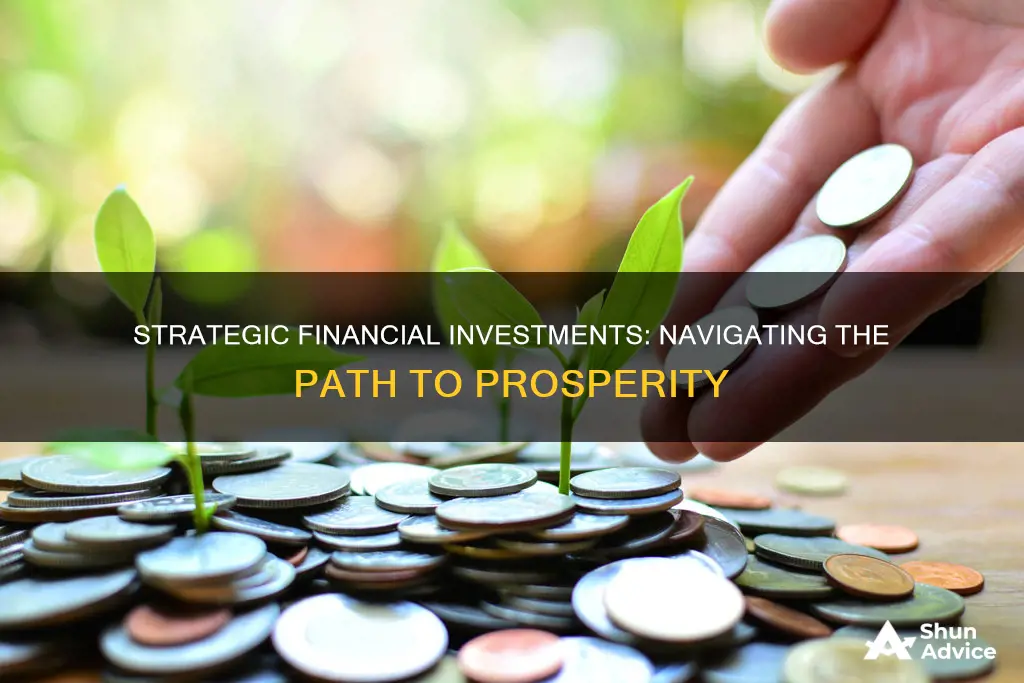
There are many types of financial investments, each with its own level of risk and potential reward. Generally, the higher the risk, the higher the reward. Here are some of the most common types of financial investments:
- Stocks or equities: These are shares of ownership in a company, which can entitle the investor to dividend distributions from the company's profits. Stocks can also increase in value over time, resulting in capital gains.
- Bonds or fixed-income securities: Bonds are a form of investment where the investor lends money to a company or government in exchange for recurring interest payments. At maturity, the investor receives the original capital invested plus any accrued interest.
- Index funds or mutual funds: These are investment vehicles that aggregate specific investments into one package. Index funds are passively managed, aiming to imitate a benchmark index, while mutual funds are actively managed, aiming to beat a specific benchmark.
- Real estate: Real estate investments involve acquiring physical properties that can be utilised for residential, commercial, or industrial purposes.
- Commodities: Commodities are raw materials such as agricultural products, energy sources, or precious metals. Investors can invest directly in tangible commodities or choose alternative investment products, such as ETFs or mutual funds that provide exposure to the commodity market.
- Cryptocurrency: Cryptocurrencies are blockchain-based digital currencies that can be used for transactions or held as a store of value. Cryptocurrency companies can issue coins or tokens that may increase in value over time.
- High-yield savings accounts: These accounts offer higher interest rates than traditional savings accounts, providing a modest return on your money while also offering liquidity and FDIC insurance.
- Certificates of Deposit (CDs): CDs are low-risk, low-return investments offered by banks and credit unions. They have fixed maturity dates, and early withdrawal may result in a penalty.
| Characteristics | Values |
|---|---|
| Accessibility | Some investments are more accessible than others. For example, stocks are available to almost anyone regardless of age, income, risk tolerance, or career. |
| Risk | The level of risk varies across different types of investments. Generally, the higher the risk, the higher the reward. |
| Returns | Different types of investments offer different potential returns. For example, stocks have consistently proven to be the best way to build wealth over the long term. |
| Time horizon | The time horizon refers to the length of time that an investment is held. Some investments are more suitable for short-term savings, while others are better for long-term goals. |
| Liquidity | Some investments are more liquid than others, meaning they can be easily converted into cash. For example, stocks are liquid investments that can be traded through personal brokerage accounts. |
| Tax implications | Different types of investments have different tax implications. For example, dividend income is taxed differently than capital gains. |
| Diversification | Investments can be diversified to reduce risk. For example, mutual funds allow investors to pool their money to buy a collection of different types of investments. |
| Research | It's important to research and understand the vehicles you are putting your money into before investing. |
| Personal spending plan | Before investing, individuals should ensure they have enough capital to pay monthly expenses and have built up an emergency fund. |
What You'll Learn

High-yield savings accounts
- Look for a good interest rate: The APY, or annual percentage yield, is an important factor when choosing a high-yield savings account. The most competitive offers tend to come from online banks and credit unions, as they have lower overhead costs than traditional brick-and-mortar banks.
- Consider convenience: While interest rates are important, don't forget to consider other factors such as customer service, ease of access, and fees.
- Ensure it has FDIC insurance: Make sure that the bank you choose is a member of the Federal Deposit Insurance Corp., which protects customer deposits in case of a bank failure.
- My Banking Direct: 5.45% APY
- UFB Direct: 5.25% APY
- Credit Karma Money Save: 5.10% APY
- Bask Bank: 5.10% APY
- Popular Direct: 5.05% APY
- Varo: 3.00% APY (5.00% if certain requirements are met)
The Debt Dilemma: Navigating Investments and Savings
You may want to see also

Long-term certificates of deposit
- 5-year maturity
- 7-year maturity
- 10-year maturity
Long-term CDs may be useful if:
- You have a fully funded emergency fund for short-term financial needs
- You don't expect CD interest rates to rise anytime soon
- You want a safe, secure place to keep your savings until you need them
Compared to short-term CDs, long-term CDs tend to offer better rates. Banks use higher rates as an incentive to get savers to choose longer CD terms. So, instead of earning 0.50%, for example, you might earn 2.00%. Online banks may offer higher rates for long-term CDs compared to traditional banks.
The Federal Deposit Insurance Corporation (FDIC) insures CDs offered by banks, and the National Credit Union Administration (NCUA) insures CDs offered by credit unions. In both cases, up to $250,000 of your funds are protected in the rare event that the institution fails.
One way to take advantage of the benefits of both short-term and long-term CDs is to build a CD ladder. This strategy involves dividing your cash into multiple CDs with different maturity dates. For example, instead of putting $10,000 into a 5-year CD, you could put $2,000 each into 1-, 2-, 3-, 4-, and 5-year CDs. As each CD matures, you can choose to reinvest the money in a new 5-year CD, or withdraw it and invest elsewhere.
Savings Woes: Firms' Investment Blues
You may want to see also

Long-term corporate bond funds
Investment-grade long-term bond funds often reward investors with higher returns than government and municipal bond funds. But the greater rewards come with some added risk.
You can buy and sell corporate bond funds with any broker that allows you to trade ETFs or mutual funds. Most brokers allow you to trade ETFs for no commission, whereas many brokers may require a commission or a minimum purchase to buy a mutual fund.
- SPDR® Portfolio Long Term Corp Bd ETF
- IShares 10+ Year Invmt Grd Corp Bd ETF
- Vanguard Long-Term Corporate Bd ETF
- Invesco Taxable Municipal Bond ETF
- IShares Core 10+ Year USD Bond ETF
- Vanguard Long-Term Bond ETF
- FlexShares Crdt-Scrd US Lng Corp Bd ETF
Retirees: Where to Invest Your Money
You may want to see also

Dividend stock funds
When choosing a dividend stock fund, investors should consider the fund's diversification, fees, and historical performance. It is also important to evaluate the individual stocks within the fund to ensure they fit into your overall portfolio. Some things to consider when evaluating a dividend stock include comparing the dividend yields among its peers and looking at the stock's payout ratio.
It is worth noting that dividend stocks in taxable brokerage accounts are taxed in the year the dividends occur, unlike stocks that do not pay dividends, which are usually taxed when the stock is sold. Therefore, for investors with taxable accounts and in high-income brackets, dividend stocks might not be as tax-efficient as other options.
Retirement Planning: Navigating the Investment Landscape for a Secure Future
You may want to see also

Value stock funds
- Vanguard Equity-Income Fund Investor Shares (VEIPX): This fund focuses on investing in large-cap companies that pay investors above-average dividends. It is suitable for investors seeking higher yields with a long-term investment horizon.
- ClearBridge Large Cap Value Fund (SAIFX): This actively managed value fund seeks capital appreciation and income through a value-focused investing strategy. It offers multiple share classes and pays a consistent quarterly dividend.
- Invesco S&P 500 Enhanced Value ETF (SPVU): This fund tracks the performance of the S&P 500 Enhanced Value Index and invests at least 90% of its assets in stocks that are part of this index. These stocks tend to be undervalued based on fundamental analysis.
- IShares Edge MSCI USA Value Factor ETF (VLUE): This index fund seeks to replicate the holdings and returns of the MSCI USA Enhanced Value Index, which includes large- and mid-cap US stocks with value characteristics trading at comparatively low valuations.
- Fidelity Value Factor ETF (FVAL): This fund seeks out profitable companies with sound growth prospects, respectable balance sheets, and value pricing. It has outperformed its peer group over the past one, three, and five years.
- Vanguard International High Dividend Yield ETF (VYMI): This passively managed index fund targets global companies based outside the US that offer above-average dividend yields. It holds over 1,300 companies, with an average market cap of $67 billion, and seeks high-quality, low-volatility stocks.
- Vanguard Mid-Cap Value ETF (VOE): This passively managed index fund captures the returns of mid-cap value stocks and has an average market cap of about $25 billion for its roughly 195 companies. It is well-diversified across various sectors, ensuring that no single holding will significantly influence the fund's returns.
- Vanguard Small-Cap Value ETF (VBR): With over 800 small-cap value stocks, this ETF has a price-earnings ratio slightly lower than its peers and strong forecasted earnings per share growth. It has outperformed the Vanguard Small Cap Growth Fund (VBK) in recent years.
Gov't Spending: Young vs. Old
You may want to see also
Frequently asked questions
Financial investments include stocks, bonds, mutual funds, exchange-traded funds (ETFs), annuities, certificates of deposit (CDs), commodities, and real estate.
You should consider your risk tolerance, time horizon, financial knowledge, and how much money you can invest. It's important to diversify your investments to reduce risk, but this may lower your potential earnings.
Consult a financial advisor or use an online tool to help you choose investments that align with your goals and risk tolerance. It's also important to do your research and understand the vehicles you are putting your money into.







